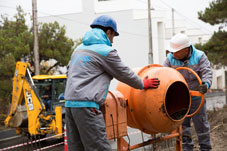
GWP workers go on strike, demand better salaries and work conditions
By Nika Gamtsemlidze
Friday, January 29
Several workers from the water supply company Georgian Water and Power went on strike on January 25. The workers demand better salaries, healthcare and access to paid leave, which they’re entitled to according to the Labor Code.
The workers refused to carry out their duties if the company didn’t meet their demands. They gathered in front of their office building to voice said demands.
The company addressed the strike and said that the workers were violating their contracts by refusing to work.
“Some of the company's contractors have been refusing to do their job for two days now. Their duties are laid down in a particular contract, the terms of which they breach by their actions. On the one hand, they do not perform their duties without any prior notice, and on the other hand, they prevent others from doing their job,” the company said in a statement.
Representatives of the company met with the workers on January 28 and came to an agreement. However, the company refused to continue contracts of 13 workers who were “active at the protests and with the media”. The rest of the workers on strike are refusing to go back to work without their peers who were fired.
The workers are also demanding equalizing their salaries. According to one of the employees currently on strike, some people receive GEL 4.2, while others get GEL 5.5 per hour for the same work. Furthermore, they demand raising their hourly wages by GEL 1 for everyone.
After consultations between the company and the workers on January 26-27, the agreement was reached to equalize the salaries, but not increase them. While these terms were good enough for some of the employees, they still refused to go back to work since 13 of their peers lost their positions.
An independent labor union Solidarity Network met with the workers and listened to their demands on January 27. The Solidarity Network lawyer Davit Osmarashvili notes that the Labor Inspection should get involved in the case.
“In the middle of the pandemic, these people are staying without pay, it’s important for the State to assume the role of a mediator [between the workers and the company],” said Osmarashvili.
“The drivers, the operators… We are the people who answer the calls whenever something goes wrong in the city. In other words, we are the ones who get the work done, we work day and night,” the workers state.
Despite the initial agreement, the GWP employees are refusing to go back to work until the fired workers are reinstated at their positions.


